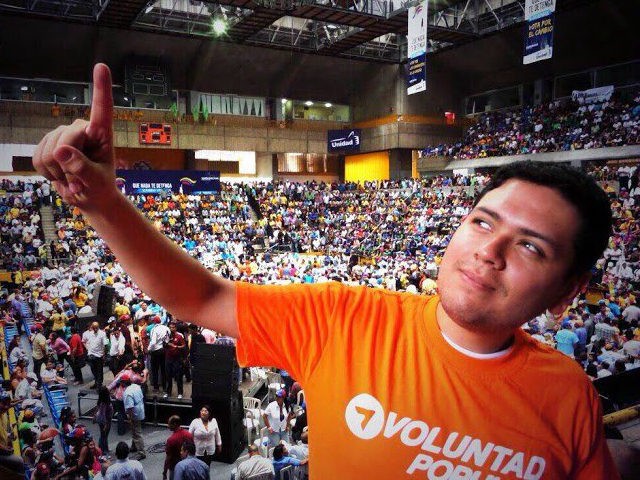Rosmit Mantilla, an LGBT activist and elected lawmaker for Venezuela’s western Táchira state, marked his second year imprisoned in a secret police facility after being arrested for alleged illicit activity against the socialist regime. He has still not been convicted of any crime.
Mantilla is a member of Popular Will, the largest anti-Chavista political party in the country, and was detained by Venezuela’s Secret Police (Sebin) on May 2, 2014, on charges of accepting bribes for organizing anti-socialist protests. According to the government of socialist president Nicolás Maduro, an anonymous tipster told police that Mantilla had received money from unnamed businessmen to organize rallies against the government. The Sebin searched Mantilla’s home on May 2 and allegedly found envelopes full of money as evidence of the bribery taking place.
Mantilla’s family and attorneys have insisted the story is false and accused Sebin of planting the envelopes in his home during the “search.”
Amnesty International has deemed Mantilla a “prisoner of conscience,” noting that he has been denied his due process rights, and the government has yet to prove its case against him. Amnesty has documented 11 times that Venezuelan courts have postponed a hearing on Mantilla’s case and an additional nine months of “procedural delays.” He continues to await his day in court.
To mark Mantilla’s two-year anniversary as a prisoner of conscience, his family held a press conference where they read a letter Mantilla wrote for the occasion from prison. “After two years of abduction, my commitment to freedom and democracy today is more robust and unyielding,” his sister read to reporters, in a letter where Mantilla concluded calling for Venezuelans to “heed the call of that better Venezuela marked by peace, freedom and progress.”
Lawmaker Tamara Adrián, who heads Popular Will’s “pro-inclusion movement,” asserted that the Venezuelan courts were holding Mantilla because “of his different way of thinking. There is no charge indicating that Rosmit deserves to be in jail.” Mantilla was one of the first leaders of the LGBT pro-inclusion wing of Popular Will.
Mantilla was elected a representative to Venezuela’s National Assembly in December despite being imprisoned, placed on the ballot in his native Táchira, along with two other victorious political prisoners in that election: Renzo Prieto, also of Táchira, and Gilberto Sojo of Caracas. All three are considered “substitute” lawmakers, though they cannot be legally kept off of ballots because none have been convicted of any crime.
A report in Venezuela’s El Nacional notes that Mantilla appears to have deteriorated significantly health-wise in prison, despite being only 33 years old. The newspaper describes him as having “dark knuckles due to a lack of calcium” and having lost near 40 pounds in prison. His vision also appears impaired.
Mantilla is one of a number of prominent political leaders arrested on suspicious charges languishing in Venezuelan prisons. The head of the Popular Will Party, Leopoldo López, is currently serving a 13-year sentence on charges of “inciting violence,” “terrorism,” and “arson,” after being arrested for organizing a peaceful rally in February 2014.
The mayor of San Cristóbal, the capital city of Táchira state, Daniel Ceballos, was arrested a month later on charges of inciting violence. He also remains in prison. The mayor of the national capital, Caracas, remains currently detained in a secret police facility after being hauled out of his office at night in February 2015.
The violence in Mantilla’s native Táchira state has been so overwhelming that Governor José Gregorio Vielma Mora, a member of the rule United Socialist Party of Venezuela (PSUV), called for an end to violent state repression in 2014.
In March, a group of protesters in Táchira stole a public transportation bus and used it to crush a crowd of police officers, killing two.
The majority in the National Assembly, currently a coalition of opposition parties, passed a bill approving the release of all the nation’s political prisoners earlier this year. Maduro threatened to veto the bill. Fearing an override, he sent it to the Supreme Court, where the socialist-friendly justices decreed the bill unconstitutional.

COMMENTS
Please let us know if you're having issues with commenting.